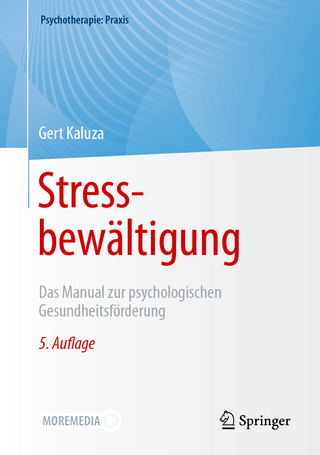
Handbook of Research on Student Engagement
Springer International Publishing (Verlag)
978-3-031-07852-1 (ISBN)
Key areas of coverage include:
- Demography and structural barriers to student engagement.
- Developmental and social contexts of student engagement.
- Student engagement and resilience.
- Engaging students through effective academic instruction and classroom management.
- Social-emotional learning and student mental health and physical well-being.
- Student engagement across the globe, languages, and cultures.
The second edition of the Handbook of Research on Student Engagement is the definitive resource for researchers, scientist-practitioners and clinicians as well as graduate students in such varied fields as clinical child and school psychology, social work, public health, educational psychology, teaching and teacher education, educational policy, and all interrelated disciplines.
Amy L. Reschly, Ph.D., is a professor and department head of Educational Psychology at the University of Georgia. Her scholarly work focuses on student engagement, dropout prevention, and working with families to promote student success. She is co-editor of the first edition of the Handbook of Research on Student Engagement and the Handbook of Student Engagement Interventions. Sandra L. Christenson, Ph.D., Professor Emeritus, Department of Educational Psychology at the University of Minnesota, continues to research interventions that enhance engagement at school and with learning for marginalized students with and without disabilities. She has been a principal investigator on several federally funded projects in the areas of dropout prevention and family-school partnerships, including Check & Connect, which is in its 29th year of research and implementation. Dr. Christenson publishes extensively; recently she co-edited the Handbook of Research on Student Engagement and the Handbook of Student Engagement Interventions.
lt;p>Section I: Defining Student Engagement: Models and Related Constructs
1) Jingle Jangle Revisited: History and Further Evolution of the Student Engagement Construct
2) Using the Positive Synergy Between Engagement and Motivation
3) Situated Expectancy Value Theory, Dimensions of Engagement, and Academic Outcomes
4) Study Demands - Resources Model of Student Engagement and Burnout
5) Agentic Engagement
6) Academic Emotions and Student Engagement
7) School Belonging and Student Engagement: The critical overlaps, similarities, and implications for student outcomes.
8) Self-Efficacy and Engaged Learners
9) Using Self-Regulated Learning (SRL) Assessment Data to Promote Regulatory Engagement in Learning and Performance Contexts
10) Hope and Student Engagement/Disengagement
Section II: Student Engagement: Positive Development and Outcomes
11) Relationships between Student Engagement and Mental Health as Conceptualized from a Dual-Factor Model
12) Resilience and Student Engagement: Promotive and Protective Processes in Schools
13) Developmental Relationships and Student Academic Motivation: Current Research and Future Directions.
14) Early Childhood Engagement
15) Using Positive Student Engagement to Create Opportunities for Students with Troubling and High-Risk Behaviors
16) Student Engagement and School Dropout: Theories, Evidence, and Future Directions
17) Exploring the Character of Student Persistence in Higher Education: The Impact of Perception, Motivation, and Engagement
Section III: Contexts for Engagement
18) Expanding an Equity Understanding of Student Engagement: The Macro (Social) and Micro (School) Contexts.
19) Parental Influences on Achievement Motivation and Student Engagement
20) Teacher-Student Relationships, engagement in school, and student outcomes
21) The Role of Peer Relationships on Academic and Extracurricular Engagement in School
22) Instruction and Student Engagement: Implications for Academic Engaged Time
23) The Role of Academic Engagement in Students' Educational Development: Insights from Load Reduction Instruction and the 4M Academic Engagement Framework.
24) Achievement Goal Theory and Engagement
25) Student Engagement: The Importance of the Classroom Context
26) Student Engagement and Learning Climate
27) Engaging High School Students in Learning
28) : The Role of Policy in Supporting Student Engagement
Section IV: Measurement
29) The Measurement of Student Engagement: Methodological Advances and Comparison of New Self-Report Instruments.
30) "Measuring Student Engagement with Observational Techniques) "31) Multicultural and Cross-Cultural Considerations in Understanding Student Engagement in Schools: Promoting the development of Diverse Students Around the World
32) Measuring Student Engagement: New Approaches and Issues
33) Advances in Student Engagement: Conceptual, Empirical, and Applied Considerations
| Erscheinungsdatum | 21.10.2022 |
|---|---|
| Zusatzinfo | XXIV, 670 p. 39 illus., 9 illus. in color. |
| Verlagsort | Cham |
| Sprache | englisch |
| Maße | 178 x 254 mm |
| Gewicht | 1421 g |
| Themenwelt | Geisteswissenschaften ► Psychologie ► Entwicklungspsychologie |
| Geisteswissenschaften ► Psychologie ► Klinische Psychologie | |
| Geisteswissenschaften ► Psychologie ► Pädagogische Psychologie | |
| Medizin / Pharmazie ► Medizinische Fachgebiete ► Psychiatrie / Psychotherapie | |
| Studium ► Querschnittsbereiche ► Prävention / Gesundheitsförderung | |
| Schlagworte | Academic achievement and student motivation • Achievement goal theory and student engagement • Attendance, dropout, and student engagement • Belonging and school attachment • Cognitive engagement and student motivation • College attendance and persistence • Coping, resilience and student engagement • Demography, structural barriers and student engagement • Developmental and social contexts of student engagement • Family, school, and community contexts and student success • Language, culture and student engagement • Peer relationships and academic achievement • Positive youth development, well-being and academic success • School climate and student engagement • School connectedness and student engagement • School identification and student engagement • School reform and student engagement • Self-determination theory and student engagement • Self-efficacy, self-regulation and engaged learning • Social-emotional learning and student engagement |
| ISBN-10 | 3-031-07852-7 / 3031078527 |
| ISBN-13 | 978-3-031-07852-1 / 9783031078521 |
| Zustand | Neuware |
| Haben Sie eine Frage zum Produkt? |
aus dem Bereich


